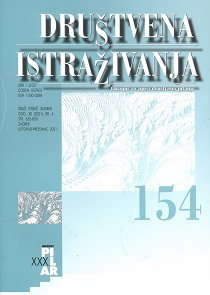Varanje na ispitima: uloga motivacije za učenje i kontekstualnih čimbenika
Academic Cheating: The Role of Motivational and Contextual Factors
Author(s): Vanja Putarek, Nina Pavlin-Bernardić, Barbara BunozaSubject(s): Ethics / Practical Philosophy, Labor relations, Higher Education , Behaviorism, Sociology of Education
Published by: Institut društvenih znanosti Ivo Pilar
Keywords: academic cheating; contextual factors; motivational beliefs; students of technical studies;
Summary/Abstract: The aim of this study was to examine the relationships between motivational beliefs (achievement goals, self-efficacy, self-efficacy in self-regulated learning), as well as contextual factors, and academic cheating in midterm and final exams at technical faculties of the University of Zagreb. The participants were 398 students enrolled in all five years of the study. Data were collected by the Achievement Goals Scale, the Self-Efficacy Scale, the Self-Efficacy for Self- -Regulated Learning Scale, the Contextual Reasons for Cheating on Exams Scale, and the Academic Cheating Scale. The results demonstrated that, compared to lower- -year students, higher-year students had higher self-efficacy and self-efficacy in self-regulated learning, but lower performance-avoidance and work-avoidance goals. There were no differences in other motivational beliefs, frequency of academic cheating and reliance on contextual factors. Frequency of academic cheating was positively related to work-avoidance goals and contextual factors, and it was negatively related to average grade in previous academic year, self-efficacy in self-regulated learning, and mastery- -approach goals. The analysis of incremental validity of contextual factors revealed that they explained 28.6% of the variance of academic cheating above and beyond motivational beliefs. Moreover, the results showed a greater independent contribution of contextual factors in explaining academic cheating compared to the contribution of motivational beliefs.
Journal: Društvena istraživanja - Časopis za opća društvena pitanja
- Issue Year: 31/2022
- Issue No: 1
- Page Range: 89-111
- Page Count: 23
- Language: Croatian

